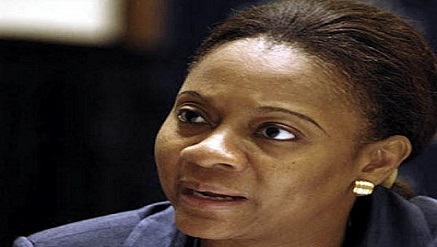This is contained in a statement signed by Dr Ejike Ndiulo, head of Corporate Communications, Air Peace, on Wednesday in Lagos.
According to Ndiulo, the decision is necessary because NiMet is the agency responsible for issuing CNH (Current Nowcast of Hazardous Weather) reports, critical for safe landings, especially during this season of heavy rainfall and thunderstorms.
He said without these reports from the control tower, flight safety could not be guaranteed.
“As a safety-first airline, we have chosen to act responsibly by suspending operations until NiMet resumes full service.
“We understand this may cause inconvenience, and we sincerely apologise. Passengers will be contacted with updates and options for rescheduling,” he said.
The staff of NiMET on Tuesday commenced an indefinite strike over the condition of service and other demands.
News
FRC Accuses SEC, NPA of not Remitting N28.27Bn

The Fiscal Responsibility Commission (FRC) has accused two government agencies – the Securities and Exchange Commission (SEC) and the Nigerian Ports Authority (NPA) – of failing to remit their operating surpluses amounting to N28.27bn.
At separate meetings held between the FRC and the two agencies in Abuja yesterday, officials of FRC also accused the two agencies of contravening the FRC Act 2007 by failing to submit their audited accounts, approved annual budgets and Medium Term Expenditure Framework.
FRC said SEC had failed to remit N10.34bn accruing to the agency as operating surplus in 2007 and N11.61bn in 2008 while it said that NPA failed to remit N3.79bn in 2007 and N2.53bn in 2008.
In a brief made available to SEC officials ahead of the meeting on Monday, FRC said, “In the process of monitoring the compliance of SEC to the FRA 2007, we observed the following:
“For year 2007, 80 per cent of SEC operating surplus was supposed to be N11,152,535,000 rather than N808,736,586,40 which SEC had earlier remitted to the Federal Government as 80 per cent of its operating cash surplus. SEC has therefore been unduly withholding the balance of N10, 343,798, 413.60 due to the Federal Government.
“SEC’s 2008 audited financial report indicated an excess of income over expenditure of N14, 506,368,610. Eighty per cent of this sum is due the Federal Government and should thus have been remitted into the Consolidated Revenue Fund of the Federal Government before the end of April 2009.
“In spite of all the reminders that this commission has sent SEC, there is no indication that SEC has made this due remittance after these years.”
FRC added, “There is no evidence that SEC has produced its audited financial reports for 2009, 2010, 2012 and 2013. Each year’s account was due on 31st March of the succeeding year.
“In spite of this commission’s various requests, SEC has not availed the FRC of its three-year estimates of revenue and expenditure for 2010 – 2012, 2012 – 2014 and 2013 – 2015. SEC has failed to forward to the FRC its approved annual budgets for 2010, 2011, 2012, 2013 and 2014.
“There is no indication to the effect that SEC has appropriately computed and duly remitted 80 per cent of its operating surpluses for 2009, 2010, 2011, 2012 and 2013.”
Sunday Garuba, deputy director, Treasury at SEC, said the audited accounts of the agencies for the years demanded by FRC were ready and would be made available.
He also said that as a regulator, SEC had been sticking to the rules but added that in recent times; the agency had been operating on the basis of zero budget and that the downturn in the capital market operation beginning from 2008 had affected the capacity of the organisation to make money.
In another brief on NPA, FRC accused SEC of failure to prepare and publish their 2012 and 2013 audited financial reports in compliance with Section 23 (3) of the FRA, 2007; failure to create a General Reserve Fund and allocate thereto, 20 per cent of its operating surplus pursuant to section 22 (1) of the FRA, 2007.
It said the agency failed to remit N3,788,116,000 to the Consolidated Revenue Fund being operating balance of its operating surplus for 2007 and another operating surplus of N2,527,637,200 for 2008.
Chief Victor Murako, chairman of FRC, said it was imperative for all government agencies to remit their operating surpluses to the government coffers, adding that the transformation agenda of President Goodluck Jonathan cannot be realised without proper funding.
News
Air Peace Suspends Flight Operations Nationwide

News
NITDA Fixes Date for Inaugural Meeting of the Startup Consultative Forum

The National Information Technology Development Agency (NITDA) is pleased to announce the inaugural meeting of the Startup Consultative Forum, scheduled for Monday April 28, 2025 This milestone event marks a significant step in deepening stakeholder engagement within Nigeria’s growing startup ecosystem.

The Forum will serve as an interactive platform for startup founders, innovators, ecosystem enablers, and intermediaries to actively shape national policies that foster growth, attract investment, and drive digital innovation.
Convened under the framework of the Nigeria Startup Act (NSA), this initiative reflects the government’s commitment to making startups not just stakeholders but key contributors in building an enabling environment for innovation.
The meeting will emphasize collaborative dialogue, with a primary focus on nominating and selecting representatives for the National Council for Digital Innovation and Entrepreneurship (Startup Council)—Nigeria’s highest advisory body for the startup ecosystem. Decisions from this Forum will lay the foundation for inclusive policy development, amplifying the voices of Nigeria’s tech and innovation community.
NITDA invites all Labelled Startups, Verified Entrepreneurial and Innovation Support Organisations, Angel Investors, Venture Capitalists, and other relevant stakeholders to join the Forum and actively participate in the nomination and voting process.
Join us in shaping the future of digital innovation in Nigeria. Together, we can build a thriving ecosystem that supports and celebrates the pioneering spirit of Nigerian startups.
News
IMF Downgrades Nigeria’s Economic Growth Forecast Amid Oil Price Decline

International Monetary Fund (IMF) has revised downward its economic growth forecast for Nigeria in 2025 to 3.0%, a 0.2 percentage point cut from its earlier projection of 3.2%.

The downgrade is attributed to a decline in global crude oil prices, which remain a significant driver of Nigeria’s economy.
The updated figures were published in the IMF’s April 2025 World Economic Outlook (WEO) report, released in Washington, DC, during the ongoing Spring Meetings of the IMF and the World Bank.
The report outlines global and regional economic trends, highlighting continued vulnerability among oil-dependent economies.
According to the IMF, growth across sub-Saharan Africa is also expected to experience a modest decline, with projections falling from 4.0% in 2024 to 3.8% in 2025. However, a slight recovery is anticipated in 2026, with growth forecasted at 4.2%.
Nigeria, Africa’s largest economy, was singled out in the report as among the major economies affected by falling oil prices. The IMF noted that the country’s 2026 growth forecast has also been revised downward by 0.3 percentage points.
The IMF further reported similar economic challenges in other African countries. In South Africa, growth projections were adjusted downward by 0.5 percentage point for 2025 and 0.3 percentage point for 2026.
These revisions reflect weakening economic momentum following a lacklustre 2024, growing uncertainty, a rise in protectionist economic policies, and the impact of a broader global slowdown.
In a more severe adjustment, the IMF slashed South Sudan’s 2025 economic growth forecast by a staggering 31.5 percentage points.
The sharp decline is linked to delays in the resumption of oil production after a major pipeline sustained damage, significantly impacting the country’s revenue and export capacity.
The IMF’s outlook underscores the fragility of economies heavily reliant on natural resources and the ongoing risks posed by global market volatility.

 Telecom3 days ago
Telecom3 days agoDigital Transformation Remains Africa’s Gateway to Economic Advancement – Adumike

 Telecom3 days ago
Telecom3 days agoPAFON 2.0: Experts Discuss Pathways to Boost Financial Inclusion in Nigeria

 General News3 days ago
General News3 days agoEFCC Clarifies SCUML Certificate Misuse amid CBEX Ponzi Scheme Scandal

 Telecom2 days ago
Telecom2 days agoMTN Nigeria Faces Class Action Lawsuit over Alleged Data Mismanagement

 E-Financial3 days ago
E-Financial3 days agoCBN, NGX Group Defend Economic Reforms at Nasdaq

 General News2 days ago
General News2 days agoFG to Introduce New Tax Credit Scheme to Replace Pioneer Status Incentive

 E-Financial2 days ago
E-Financial2 days agoFCMB Capital Markets Leads ₦11.85bn GLNG Bond for LNG Plant Expansion

 Telecom2 days ago
Telecom2 days agoNigeria Hits 1 Terabit Internet Traffic Milestone



























